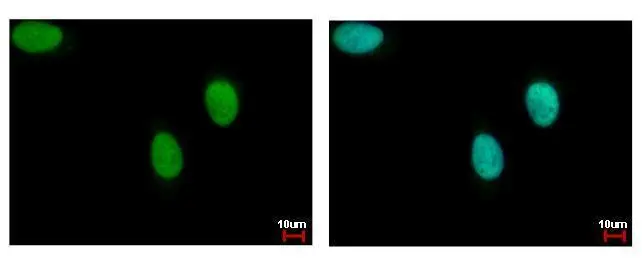
DNA ligase III antibody detects LIG3 protein at nucleus by immunofluorescent analysis. Sample: HeLa cells were fixed in 4% paraformaldehyde at RT for 15 min. Green: LIG3 protein stained by DNA ligase III antibody (GTX103172) diluted at 1:500. Blue: Hoechst 33342 staining.
DNA ligase III antibody
GTX103172
ApplicationsImmunoFluorescence, Western Blot, ImmunoCytoChemistry, ImmunoHistoChemistry, ImmunoHistoChemistry Paraffin
Product group Antibodies
ReactivityHuman, Mouse
TargetLIG3
Overview
- SupplierGeneTex
- Product NameDNA ligase III antibody
- Delivery Days Customer9
- Application Supplier NoteWB: 1:500-1:3000. ICC/IF: 1:100-1:1000. IHC-P: 1:100-1:1000. *Optimal dilutions/concentrations should be determined by the researcher.Not tested in other applications.
- ApplicationsImmunoFluorescence, Western Blot, ImmunoCytoChemistry, ImmunoHistoChemistry, ImmunoHistoChemistry Paraffin
- CertificationResearch Use Only
- ClonalityPolyclonal
- Concentration1.22 mg/ml
- ConjugateUnconjugated
- Gene ID3980
- Target nameLIG3
- Target descriptionDNA ligase 3
- Target synonymsLIG2, LIG3alpha, MTDPS20, DNA ligase 3, ligase II, DNA, ATP-dependent, ligase III, DNA, ATP-dependent, polydeoxyribonucleotide synthase [ATP] 3
- HostRabbit
- IsotypeIgG
- Protein IDP49916
- Protein NameDNA ligase 3
- Scientific DescriptionThis gene is a member of the DNA ligase family. Each member of this family encodes a protein that catalyzes the joining of DNA ends but they each have a distinct role in DNA metabolism. The protein encoded by this gene is involved in excision repair and is located in both the mitochondria and nucleus, with translation initiation from the upstream start codon allowing for transport to the mitochondria and translation initiation from a downstream start codon allowing for transport to the nucleus. Additionally, alternate transcriptional splice variants, encoding different isoforms, have been characterized. [provided by RefSeq]
- ReactivityHuman, Mouse
- Storage Instruction-20°C or -80°C,2°C to 8°C
- UNSPSC41116161


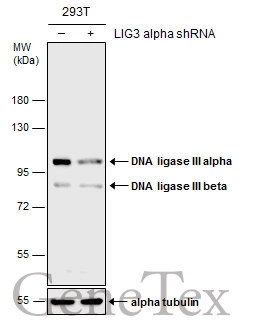
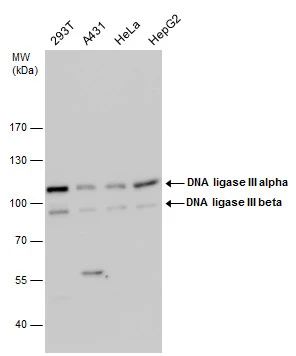
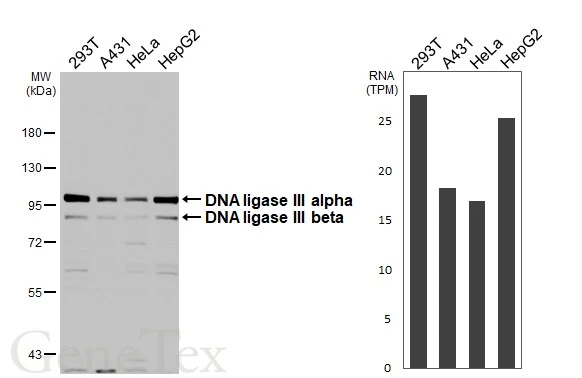

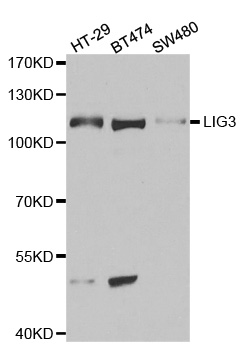


![HepG2 whole cell and nuclear extracts (30 μg) were separated by 7.5% SDS-PAGE, and the membrane was blotted with DNA ligase III antibody [HL2280] (GTX638333) diluted at 1:1000. The HRP-conjugated anti-rabbit IgG antibody (GTX213110-01) was used to detect the primary antibody.](https://www.genetex.com/upload/website/prouct_img/normal/GTX638333/GTX638333_T-44977_20230317_WB_Fraction_23032022_926.webp)
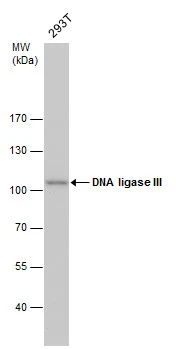
![HepG2 whole cell and nuclear extracts (30 μg) were separated by 5% SDS-PAGE, and the membrane was blotted with DNA ligase III antibody [C2C3], C-term (GTX103197) diluted at 1:500. The HRP-conjugated anti-rabbit IgG antibody (GTX213110-01) was used to detect the primary antibody.](https://www.genetex.com/upload/website/prouct_img/normal/GTX103197/GTX103197_44349_20210702_WB_Fraction_w_23060119_184.webp)